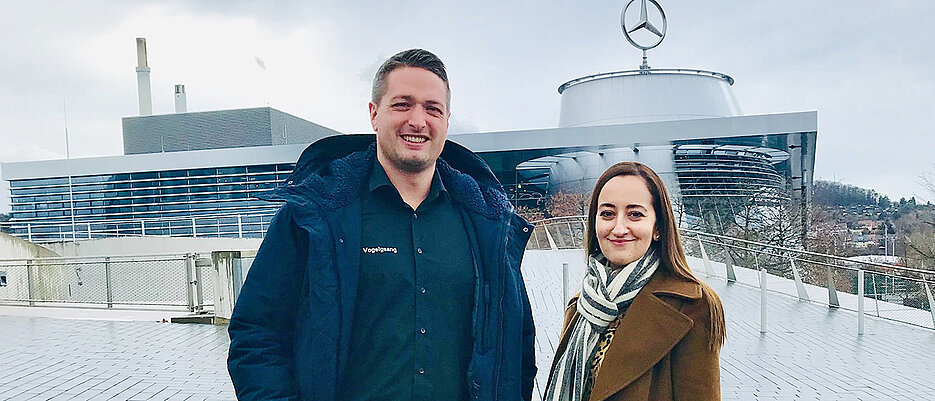From Würzburg into the world
01/31/2019They studied Slavic studies and economics; today they commute between Germany and Russia. The two alumni, Jana Kail and Markus Vogelgsang, have never regretted their choice of subjects.

Which jobs do graduates from the University of Würzburg work in? To present different perspectives to students, Michaela Thiel, the director of the central alumni network, interviews selected alumni. This time, two alumni of the University of Würzburg answer her questions. Markus Vogelgsang and Jana Kail studied Slavic studies and economics at the University of Würzburg and spent a semester abroad at Moscow State University. Today, both alumni work for a German car-maker. Within the scope of the "Moscovia" project, they work on building an automotive production facility in Moscow.
Ms Kail, when choosing your subjects, did you already know which career to pursue later on or what were the reasons? When choosing my combination of subjects, I already had the idea of going into economics, but I was positively surprised when I actually nailed the perfect job with this choice of subjects. I had opted for this combination of subjects because I wanted to develop my Russian skills to an excellent level.
Mr Vogelgsang, what did you like most about your subjects at university? Our university offers many opportunities to combine theory and practice in the respective study programmes. Personally, I liked best that I could actually implement the dry subject of business economics with practice-oriented entrepreneurship.
Ms Kail, what does your daily routine at work look like? Every day at work is different. There are always new challenges. And this is what's so exciting about our Moscovia project. We work directly with our Moscow-based colleagues and we complement each other quite well – German thoroughness and Russian improvisation skills working hand in hand.
Mr Vogelgsang, what did you like best at the University of Würzburg and at Moscow State University? In my opinion, the teachers at both universities have a very personal style of interacting and communicating with the students. This makes it very easy to quickly find your place in the community of students. This becomes particularly evident at the excellently organised exchange programme between the two universities.
Ms Kail, which challenges do you encounter working in a different culture? I often notice that communication is the biggest challenge. The way how specific content is communicated or not communicated is quite different sometimes. To be aware of this is immensely helpful to achieve the desired outcome together despite these differences.
Mr Vogelgsang, what would you recommend to students who want to work in the Russian Federation? With more than 6000 German companies operating in Russia, there are plenty of opportunities. The German-Russian Chamber of Commerce is an excellent address to get an overview. It also organises various events on German-Russian cooperation throughout the year.
Thank you for the interview.
If you want to learn more about the alumni network of the University of Würzburg or to register, follow the link below.






